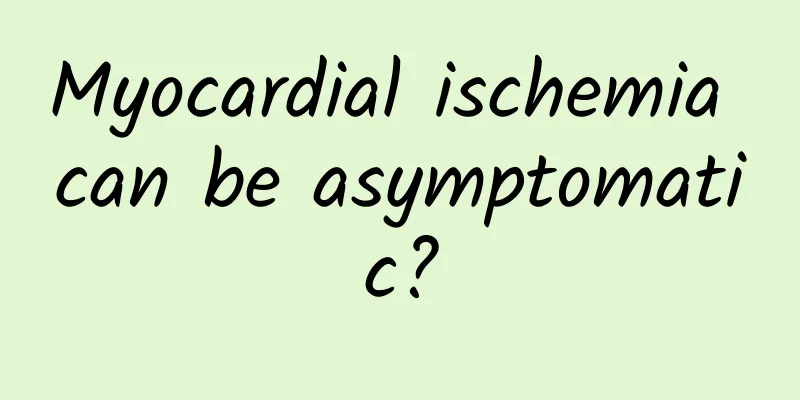Myocardial ischemia can be asymptomatic?

|
Myocardial ischemia is a common heart disease, usually related to coronary artery stenosis or blockage. However, some people may also experience myocardial ischemia without obvious symptoms. This condition is called silent myocardial ischemia. In this article, we will introduce the concept, causes, diagnosis and treatment of silent myocardial ischemia in detail. 1. The concept of silent myocardial ischemia Silent myocardial ischemia refers to myocardial ischemia that occurs in patients without obvious symptoms such as chest pain, chest tightness, and shortness of breath. This type of myocardial ischemia is usually discovered accidentally during routine examinations or other disease diagnosis. Although patients have no obvious symptoms, this silent myocardial ischemia can still cause damage to the heart and may lead to serious cardiac events such as myocardial infarction or heart failure. 2. Causes of Silent Myocardial Ischemia The causes of silent myocardial ischemia usually include coronary artery stenosis, atherosclerosis, hypertension, high cholesterol, etc. These factors can lead to reduced coronary blood flow, so that the myocardium does not get enough oxygen and nutrients, thus causing myocardial ischemia. Some other factors, such as smoking, diabetes, obesity, etc., may also increase the risk of silent myocardial ischemia. 3. Diagnosis of silent myocardial ischemia Electrocardiogram (ECG): ECG is a commonly used examination method that can detect the electrical activity of the heart. Patients with asymptomatic myocardial ischemia may show abnormalities such as ST segment depression or T wave inversion on the ECG. Holter monitor: Holter monitor is a method of continuous electrocardiogram monitoring that can detect the electrical activity of the heart during daily activities. This is very helpful in diagnosing silent myocardial ischemia. Echocardiography: Echocardiography is an examination method that uses ultrasound to detect cardiac structure and function. It can detect abnormal ventricular wall motion caused by myocardial ischemia, thereby helping to diagnose asymptomatic myocardial ischemia. Myocardial perfusion imaging: Myocardial perfusion imaging is a nuclear medicine examination method that can show the blood flow of the myocardium. Patients with asymptomatic myocardial ischemia may show a decrease or absence of local blood flow on myocardial perfusion imaging. 4. Treatment of silent myocardial ischemia Drug treatment: For patients with asymptomatic myocardial ischemia, drug treatment is the basis. Common drugs include antiplatelet drugs such as aspirin and clopidogrel, as well as lipid-lowering and antihypertensive drugs such as statins and beta-receptor antagonists. These drugs can help prevent thrombosis, lower blood lipids and blood pressure, and thus reduce the occurrence of cardiac events. Lifestyle changes: Patients with silent myocardial ischemia need to actively change their lifestyle, including quitting smoking, limiting alcohol consumption, maintaining a healthy diet, and exercising appropriately. These measures can help lower blood lipids and blood pressure and improve heart health. Surgery: For patients with severe coronary artery stenosis or blockage, surgery may be necessary. Common surgeries include coronary angiography and stent implantation. These surgeries can improve coronary blood flow and thus reduce the occurrence of myocardial ischemia. Monitoring and follow-up: Patients with asymptomatic myocardial ischemia need to undergo regular electrocardiograms, echocardiograms and other examinations to monitor changes in cardiac structure and function. In addition, patients also need regular follow-up so that doctors can adjust treatment plans according to their condition. In short, silent myocardial ischemia is a potential heart disease that needs to be taken seriously. By understanding its concept, causes, diagnosis and treatment, we can better manage and prevent this disease. If you have any questions or concerns about silent myocardial ischemia, please consult a professional doctor in time. |
<<: These strange reactions before menstruation may be a disease! How many of them do you have?
>>: Four types of itching in girls' private parts are not vaginitis! (No boys allowed)
Recommend
What is watery vaginal discharge?
Normal leucorrhea should be colorless and odorles...
What are the causes of amenorrhea after miscarriage?
Artificial abortion is a relatively common situat...
What to do if you have a sore throat when you are pregnant
The physique of pregnant women is very special. I...
The vagina is red, swollen and itchy, and the culprit is actually them
Many women have experienced itching at the vagina...
As winter and spring arrive, respiratory diseases are prevalent. What should the elderly do?
This is the 4759th article of Da Yi Xiao Hu The C...
Socialbakers: Google+ brand pages grow four times faster than Twitter
On the evening of February 21, 2012, a report rec...
Is it normal for a woman to go through menopause at 46?
Changes in menstrual periods are one of the key s...
When is the 4D color Doppler ultrasound? Don’t miss this opportunity
Generally speaking, pregnant women need to go to ...
What should women do if their gums are swollen and painful during menstruation?
Swollen and painful gums have a certain impact on...
What should I pay attention to during induced labor and confinement?
Nowadays, many young people experience unexpected...
How to treat the symptoms of endocrine disorders in women
Many women are troubled by endocrine imbalance. A...
What to do if you have no sexual desire after giving birth?
Many women will experience a decrease in sexual d...
How big is the fetus when a woman is six months pregnant?
Six months of pregnancy is one of the important m...
What lights are on the car? What lights should you turn on when driving in fog?
Headlights, or the lighting system of a car, are ...
Protect women's health and beware of the "pink killer" breast cancer! Remember the "four key points" for prevention!
Globally, breast cancer is one of the most common...









